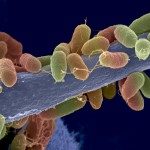Link to Pubmed [PMID] – 21724936
Eukaryotic Cell 2012 Jan;11(1):68-78
Aspergillus fumigatus is the most common and deadly pulmonary fungal infection worldwide. In the lung, the fungus usually forms a dense colony of filaments embedded in a polymeric extracellular matrix. To identify candidate genes involved in this biofilm (BF) growth, we used RNA-Seq to compare the transcriptomes of BF and liquid plankton (PL) growth. Sequencing and mapping of tens of millions sequence reads against the A. fumigatus transcriptome identified 3,728 differentially regulated genes in the two conditions. Although many of these genes, including the ones coding for transcription factors, stress response, the ribosome, and the translation machinery, likely reflect the different growth demands in the two conditions, our experiment also identified hundreds of candidate genes for the observed differences in morphology and pathobiology between BF and PL. We found an overrepresentation of upregulated genes in transport, secondary metabolism, and cell wall and surface functions. Furthermore, upregulated genes showed significant spatial structure across the A. fumigatus genome; they were more likely to occur in subtelomeric regions and colocalized in 27 genomic neighborhoods, many of which overlapped with known or candidate secondary metabolism gene clusters. We also identified 1,164 genes that were downregulated. This gene set was not spatially structured across the genome and was overrepresented in genes participating in primary metabolic functions, including carbon and amino acid metabolism. These results add valuable insight into the genetics of biofilm formation in A. fumigatus and other filamentous fungi and identify many relevant, in the context of biofilm biology, candidate genes for downstream functional experiments.



